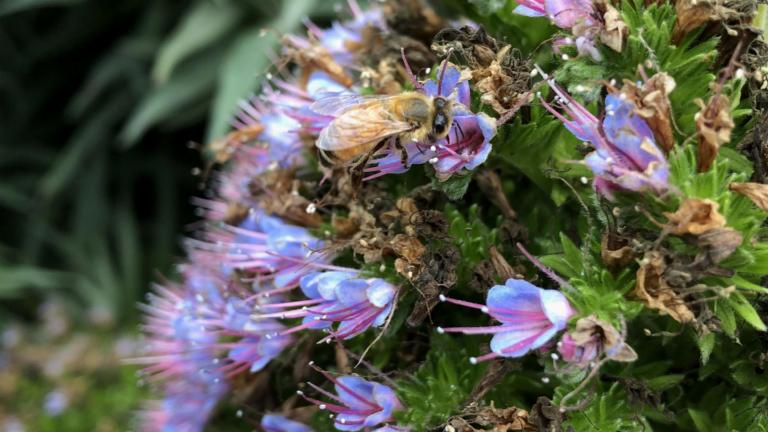
I am a plant molecular biologist with a background in pollination biology and ecology. Pollination is a key aspect of the plant life cycle – because plants are largely immobile, they rely on external forces to disperse reproductive cells. These dispersal patterns are impacted by life-history variation and spatial-temporal dynamics, producing a wide range of diversity that is influential to plant population evolution and ecology. My research focuses on understanding plant reproductive biology in the context of dispersal, and related patterns of interspecific interaction, with the goal of improving our understanding of biological community assemblage and change.
ResearchInterests
Global change is rapidly altering the structure of our world and disrupting the stability of ecological systems. At their core, terrestrial food webs rely on the mutualistic interaction between plants and pollinators, which is threatened by various environmental stressors.
Utilizing the plant-pollinator interface as a structural plane for exploration, my research seeks a greater understanding of the evolutionary and ecological context around entomophilous dispersal patterns. Through this work, I am characterizing how plants and pollinators respond to environmental change and exploring how this impacts their evolution and ecology.


Current topics
Standardized monitoring of the biodiversity crisis
Plant DNA metabarcoding has revolutionized the field of molecular ecology, leading to substantial advancements in our ability to monitor and detect changes to biological systems. The rapid adoption of this approach has led to variation in the execution of metabarcoding programs, and a lack of standardization has hindered our intercomparison abilities. In collaboration with researchers across the globe, I am working to optimize metabarcoding protocols and make bioinformatics tools widely available, with the goal of facilitating large-scale standardized monitoring of biodiversity across various ecological scales.
Phenological reshuffling of plant communities
Climate change is producing novel biospheric conditions, impacting the abiotic triggers that determine developmental timing in plants. This presents a potent evo-eco threat to plant communities and the pollinators that they rely on. Documenting these changes is key to exploring the impact of anthropogenic change on entomophilous dispersal dynamics, but ground-based historical observations are logistically constrained and limited in their scope. My work utilizes the prolific generalist Apis mellifera to monitor phenological change via the plant-pollinator interface and explore the evo-eco consequences of a rapidly changing world.
Urban pollination dynamics
Urbanization is dramatically influencing the ecology of our planet. Cities are unconventional ecosystems, populated by a diverse array of native and non-native taxa, creating intensely competitive conditions in an environment dominated by impermeable surfaces. My research focuses on exploring how gradients of urbanization impact pollination patterns, community structure, and population health, using managed honey bee colonies as model super-organisms. The aim of this work is to identify key dynamics of urban pollination and integrate ecological theory into urban design to build healthier cities for plants, pollinators, and people.
Key publications
Wizenberg, S. B., Newburn, L. R., Richardson, R. T., Pepinelli, M., Conflitti, I. M., Moubony, M., Borges, D., Guarna, M. M., Guzman-Novoa, E., Foster, L. J., Zayed, A. (2023). Environmental metagenetics unveil novel plant‐pollinator interactions. Ecology and Evolution, 13(11), e10645.
Wizenberg, S. B., Newburn, L. R., Pepinelli, M., Conflitti, I. M., Richardson, R. T., Hoover, S. E., Currie, R. W., Giovenazzo, P., & Zayed, A. (2023). Validating a multi-locus metabarcoding approach for characterizing mixed-pollen samples. Plant Methods, 19(1), 120.
Wizenberg, S. B., Muir-Guarnaccia, J., & Campbell, L. G. (2023). Cosexuality reduces pollen production and fitness in Cannabis sativa L. Plants, 12(21), 3731
Wizenberg, S. B., Dang, M., & Campbell, L. G. (2022). Methods for characterizing pollen fitness in Cannabis sativa L. Plos one, 17(7), e0270799.
Wizenberg, S. B., Weis, A. E., & Campbell, L. G. (2020). Comparing methods for controlled capture and quantification of pollen in Cannabis sativa. Applications in plant sciences, 8(9), e11389.